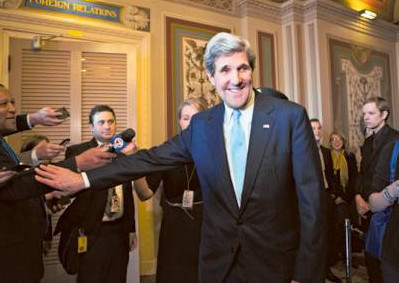
Poor John Kerry. On his first foreign trip in his new job, the US Secretary of State — and his boss — have been given a sharp slap in the face. A mission to Europe and the Middle East, which his officials declared would be for “listening” to ideas on what to do about Syria, has turned into a humiliating effort at damage limitation. The western-sponsored opposition grouping, the Syrian National Coalition (SNC), had initially rejected a meeting with Kerry that was due in Rome tomorrow. It accuses the US and its allies of being complicit in the destruction of Syria by not intervening militarily, either by arming the rebels or by direct intervention as in Libya.
What made their unexpected hardball doubly awkward is that the SNC coupled it with a repudiation of its own president, Muath Al Khatib’s recent initiative in coming out in favour of talks with Bashar Al Assad’s government. The SNC’s general assembly says it, alone, has the right to propose any initiative and the end of Al Assad’s regime remains the top priority.
The US State Department had supported Al Khatib’s taboo-breaking change of line, as had the Russians, who have continually said that the best way to end Syria’s catastrophic civil war is to open talks without preconditions. Al Assad’s departure could be the outcome, but not the essential first step. In Geneva last year, Russia and the US had agreed to a creative formula which called for a coalition government of rebels and current ministers without specifying what Al Assad’s role would be.
What will Washington do now? Barack Obama, we know, was a relative dove last year when he rejected recommendations from Hillary Clinton and David Petraeus for US weapons for the rebels. He also seemed detached last month in an interview with the New Republic when he wondered aloud whether the US “can make a difference in Syria”.
But the hawks in Washington did not give up. The New York Times reported last week that Obama might do a U-turn. So there must be suspicion that the SNC’s snub of Kerry was not what it seemed at first and it has now been reversed. The monkey was still a monkey, but it was working for a different organ-grinder, the folks in the Pentagon, the CIA and the neocon think tanks who want to deepen the militarisation of the conflict.
Change of US policy
Arming the rebels is not going to change the military situation, which is stalemated. Neither the Syrian Army nor the rebels can win. Adding more weaponry will merely raise the amount of killings and make it even harder to deliver aid to the millions who have had to flee their homes. It also risks putting more guns in the hands of jihadists and Salafists, who are conducting most of the attacks as well as planting bombs in Damascus and Aleppo, killing civilians. No doubt, if there is a change of US policy, it will be argued that the aim is to arm the “moderates”, but with the chaos on the ground, where a hundred disparate local brigades compete for the best weaponry, there is little to stop US arms gravitating to the most ruthless.
Little can save Syria now. Even if talks started and were eventually successful in producing a government of national unity and a democratic constitution, the hardline jihadists would not accept the result. The country will probably be condemned to bloodshed on the pattern of Iraq, where car bombs and suicide bombs kill hundreds every month. But even that would be better than the all-consuming civil war that is Syria’s fate today. As a man who saw the folly of the Vietnam War in his youth, Kerry should have the wisdom to choose a better course. Where his predecessor was a hawk on the issue, he needs to confront the SNC and Washington rightwingers who back them, and say Al Khatib had the better vision.
Jonathan Steele is a former chief foreign correspondent for the Guardian, who has reported regularly from Syria.












